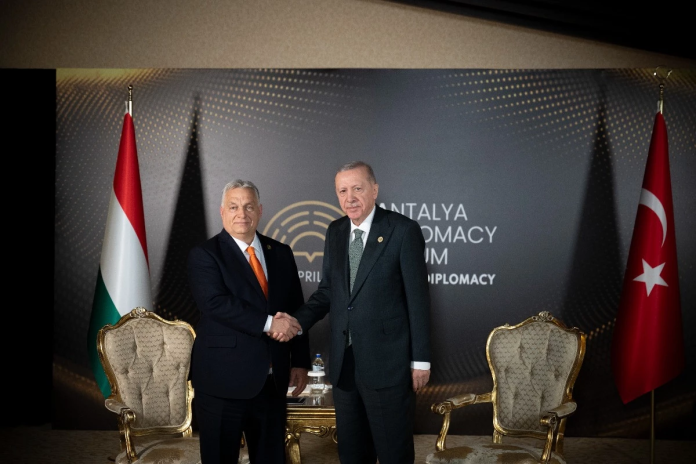Hungarian Prime Minister Viktor Orbán and Turkish President Recep Tayyip Erdoğan held talks in Antalya on 11 April, focusing on securing Hungary’s energy future and expanding bilateral cooperation amid escalating tensions with Ukraine and the EU, according to bne IntelliNews.
The meeting underscored Turkey’s role as a linchpin in Hungary’s strategy to circumvent disrupted eastern gas routes and resist Brussels’ geopolitical pressures.
Orbán emphasised that Hungary’s eastern gas supplies–historically reliant on routes through Ukraine–have “practically ceased” due to Kyiv’s “hostile behavior. With over 7.6 billion cubic metres of gas delivered via the TurkStream pipeline in 2024–up from 5.6 billion in 2023–the corridor through Turkey, Bulgaria, and Serbia now accounts for the bulk of Hungary’s imports.
The two leaders also advanced a strategic partnership between Hungary’s MOL and Turkey’s TPAO, enabling joint oil exploration in Turkey and market access for Turkish firms in Hungary. This follows a December 2024 agreement to deepen energy collaboration, positioning Turkey as a critical ally in diversifying supply chains.
Beyond energy, Orbán and Erdoğan discussed bolstering military and economic ties, with a target to increase bilateral trade to $6 billion. Erdoğan highlighted Turkey’s commitment to stabilising Syria and urged EU cooperation on counterterrorism, while Orbán reaffirmed support for Turkish EU accession bid
Orbán’s participation in the Antalya Diplomacy Forum included meetings with Georgian Prime Minister Irakli Kobakhidze to prepare for a June summit, and Željka Cvijanović of Bosnia’s presidency, where he stressed the Western Balkans’ stability as “vital for Europe.”
Meanwhile, his vocal backing of Serbian President Aleksandar Vučić–denouncing “foreign interference” in Serbia amid protests over a fatal train collapse–mirrored his domestic narrative of resisting external pressures.
Hungary’s PM also framed the partnership as a bulwark against EU “blackmail,” accusing Brussels of seeking to “bring Hungarians to their knees” through energy coercion. He praised Turkey’s “humanitarian foreign policy” in Syria and reiterated Hungary’s reliance on Ankara’s “defence ring” against migration, a theme consistent with his long-standing advocacy for EU funding to fortify Turkish borders.
